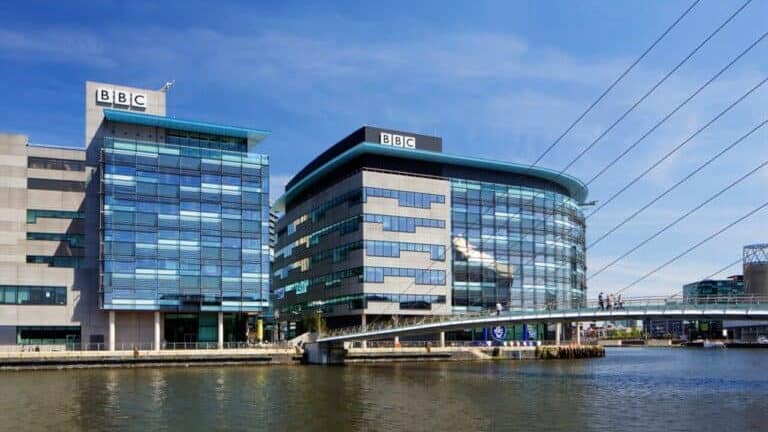The Public Accounts Committee (PAC) has published its report on the BBC’s Across the UK (ATUK) programme, under which the BBC aims to move £700m of new spending outside London by March 2028.
The report found that the BBC’s move of this spending is being taken forward without a clear plan, with concerns around the risks and impact of changes made to ATUK.
The PAC’s inquiry further found that ATUK is overly focused on moving spending outside of London as a measure of success in itself, rather than robustly tracking what positive change is achieved by doing so, such as improving the relevance of is content to local audiences, or creating new, local jobs. Plans to evaluate the programme’s impact are only due to begin in 2025 – too late to change course if needed, the report’s authors said.
The report also raised concerns that the risks and impacts of changes made to ATUK’s scope were not well understood by the BBC, with changes made to local services potentially disadvantaging certain groups. Particular concerns relate to the BBC moving budgets from its local radio to local online services, in effect reducing services for older people or those less able to access online platforms, which was part of the original ATUK programme.
The BBC’s reporting of ATUK, including in relation to local radio cuts, “does not provide Parliament nor the public with a complete picture of progress,” the PAC said.
The PAC added that it is concerned that the BBC claims benefits for ATUK publicly for activities not part of the programme when it is favourable for it to do so (for instance in the case of the relocation of its Birmingham premises), while dissociating other activities from ATUK when they could be seen as a bad news story, such as cuts to local radio.
The PAC’s inquiry found concerns that the BBC’s confidence is misplaced that ATUK will deliver as expected. While it has performed well in some areas (such as moving 58% of TV expenditure outside London against a target of 60% by December 2027), it is behind schedule in other areas with no plan to get back on track. One example of this is audio production, which has had just one percentage point of expenditure moved outside London since March 2020 (currently at 41% against a target of 50% by 2028), with a £23m shortfall in transferred spend resulting from the cancelled relocation of the BBC Concert Orchestra outside of London.
Dame Meg Hillier MP, chair of the committee, said: “The BBC is seeking to liberate hundreds of millions in spending from the gravitational pull of London, and it is understandable that the simple act of having done so would feel like success. But as with every publicly-funded project, it is incumbent on the BBC to track what positive impact its spending is having at the same time.
“Parliament and the public must also be fully satisfied that the BBC is not simply cherry-picking examples of success in delivery of Across the UK, while sweeping bad news stories under the rug as not part of the programme, in particular cuts to local radio.”
In response to the PAC’s report Thomas Wrathmell, director of Across the UK, said: “We have a very clear plan on how we will move investment, programming and decision-making across the UK to get closer to audiences, support the country’s diverse creative sectors, and develop and nurture new talent. Our pioneering programme is deliberately ambitious and has been fully assessed.
“We are incredibly proud of the progress we’ve made so far and remain focused on achieving our targets to deliver cultural and economic benefits across the UK.
“We are disappointed by some of the commentary in the Committee’s report and look forward to addressing the issues raised when we provide our written response. We will continue to provide ongoing updates to the general public and industry stakeholders through the BBC’s Annual Plan and Annual Report.”
NUJ broadcast organiser Sian Jones praised the PAC for highlighting the effects of local radio cuts on audiences in particular. She said: “The NUJ believes the BBC could do much better at being across the UK by restoring live and local output at all 39 local radio stations across England, including live and local news bulletins and genuinely local – rather than shared – programming. The loss of TV output in Oxford and Cambridge has also had a detrimental impact for local audiences in those areas.
“The BBC can be a force for good in covering, representing and lifting up communities across the UK. We recognise the progress made in shifting work outside of London, and the challenges and opportunities that brings, and agree with PAC that the benefits of those moves must be better understood for licence fee payers and audiences.
“The BBC faces significant financial challenges and that cannot be ignored. If the UK is to have the world-leading public service broadcaster, providing impartial news coverage across the UK and beyond, it is vital to ensure sustainable funding.”
Addressing the local radio question in particular, the BBC told Prolific North in a statement: “We have consistently said that we are committed to providing a strong, creative, local radio service for listeners across England and we have maintained all 39 Local Radio Stations.
“The budget for BBC Local services has not been cut, but audience habits are changing, and licence fee payers want more content available to them when they want it. We have invested in providing more local digital news and we have increased the local content available on BBC Sounds.”














